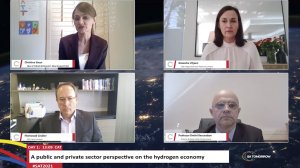JOHANNESBURG (miningweekly.com) – Synthetic fuels and chemicals company Sasol is in a position to be able to produce green hydrogen within the next 24 months, Sasol CEO Fleetwood Grobler said on Thursday.
Grobler was responding to Absa group industrials research head Christina Steyn, who moderated an SA Tomorrow panel discussion that included HySA Infrastructure director and head Professor Dmitri Bessarabov and Anglo American Platinum (Amplats) CEO Natascha Viljoen. (Also watch attached Creamer Media video.)
Expanding on the potentially lightning paced advance to green hydrogen, Grobler told the conference that it would involve Sasol advancing from its current high-carbon grey hydrogen to the new low-carbon green hydrogen.
His comments followed Bessarabov earlier pointing out that Sasol’s production of 2% of the world’s grey hydrogen represented “a very large number”.
Sasol has a collaboration agreement with vehicle manufacturer Toyota to focus on heavy duty vehicles and the infrastructure required for the refuelling of these with green hydrogen.
“We believe we have an opportunity to set up refuelling of hydrogen stations and we can do that within the next year or two because we can move currently from grey hydrogen for that purpose, and we can within the next 24 months be ready to produce green hydrogen from repurposed facilities in our Sasolburg operations and to really get that going with heavy duty trucks and buses and the like,” Grobler said.
There were opportunities to collaborate in a similar manner with others, including Anglo American along the proposed hydrogen corridor and with regard to heavy mining equipment.
“You can look at quite an interesting value chain that you can get going and let that kickstart the development of infrastructure, albeit from a very small base. It will be a progressive journey,” Grobler told the SA Tomorrow virtual conference sponsored by the JSE, Citibank and Absa and covered by Mining Weekly.
Bessarabov said that bringing hydrogen into the country’s fossil-fuel-heavy energy mix was essential for the country to meet its greenhouse gas emission and decarbonisation targets, aided by its sunshine and platinum group metals (PGMs) endowment.
“You have to have iridium and platinum in the devices that make hydrogen and you have to have platinum in fuel cells that use the hydrogen. So, all those things come together to put South Africa in a very favourable position of being able to export our sunshine from hydrogen. That’s why the Department of Science and Innovation started driving the hydrogen strategy more than ten years ago,” said Bessarabov.
With the global demand for energy expected to increase by up to 40% by 2050 and with today’s energy production still significantly exposed to fossil fuels, Viljoen said that the hydrogen economy was viewed as an important enabler of the transition to the renewable energy mix and that Amplats was looking to hydrogen both as a market for its PGM products and to assist the company along its own journey towards decarbonisation.
“We’ve seen multiple national activities in the hydrogen space and we’ve played an active role to shape and create many of them,” said Viljoen, adding that there were multiple use cases for hydrogen and fuel cell technologies.
“We’ve also continued to form strategic partnerships with various players across the sector who will benefit from the growth of the hydrogen economy and to find ways to work together to accelerate the development of the hydrogen economy. We’ve recently announced our partnership with Umicore in the development of a liquid organic hydrogen carrier,” she said.
The panel discussion on the hydrogen economy was billed as being based on PWC’s 2020 report on South Africa having world-class renewable potential that can be leveraged to supply clean energy to the world and transform the domestic economy.
Key themes highlighted in the PwC report were that:
- Hydrogen is critical to achieving global decarbonisation;
- The time to act is now;
- South Africa has the competitive advantage to produce and export green hydrogen;
- Hydrogen means more than just fuel cells;
- Investing in hydrogen is necessary to diversify the South African economy; and
- Regulation is key for South Africa to successfully capitalise on the green hydrogen opportunity.
The benefits to South Africa of investing in green hydrogen were given by PwC as:
- the opportunity to leverage its renewable energy resources into green hydrogen, green ammonia and other hydrogen-enabled products as foreign exchange earners;
- the generation of numerous jobs along the value chain and the development of a specialised skills pool;
- the reinforcement of domestic energy supply and the lowering of the landed cost of energy;
- a strengthening of the economy through sector coupling through hydrogen’s capability of carrying energy into a multitude of different sectors;
- decarbonising domestic energy and industrial sectors; and
- supporting mining as a result of hydrogen fuel cells and electrolysers stimulating demand for Southern Africa’s PGMs, plus the demand pull for metals and minerals from solar and wind power equipment.
EMAIL THIS ARTICLE SAVE THIS ARTICLE ARTICLE ENQUIRY
To subscribe email subscriptions@creamermedia.co.za or click here
To advertise email advertising@creamermedia.co.za or click here










